
Quantum
Scope & Guideline
Exploring the limitless potential of optics and quantum physics.
Introduction
Aims and Scopes
- Quantum Information Theory:
Research in this area includes the study of quantum bits (qubits), quantum algorithms, quantum cryptography, and quantum communication protocols, highlighting the unique capabilities of quantum systems in information processing. - Quantum Computing and Algorithms:
This scope covers the development of quantum algorithms, their computational complexities, and practical implementations on quantum hardware, including error correction and optimization techniques. - Quantum Mechanics Foundations:
Studies that delve into the foundational aspects of quantum theory, such as entanglement, non-locality, and the implications of quantum mechanics on classical concepts of causality and reality. - Quantum Simulation:
Research focused on using quantum systems to simulate other quantum systems, particularly in the context of condensed matter physics, high-energy physics, and quantum chemistry. - Quantum Thermodynamics:
This area explores the interplay between quantum mechanics and thermodynamic principles, investigating phenomena like quantum heat engines, thermodynamic limits, and the role of coherence in thermodynamic processes. - Quantum Materials and Devices:
Research related to the development and characterization of novel quantum materials and devices, including superconductors, quantum dots, and topological insulators, that exhibit quantum phenomena. - Quantum Machine Learning:
The intersection of quantum computing and machine learning, where quantum algorithms are applied to enhance learning processes, data analysis, and optimization techniques.
Trending and Emerging
- Quantum Error Correction and Fault Tolerance:
Research in this area is trending upwards as the need for reliable quantum computing systems increases, focusing on developing techniques to mitigate errors and enhance the performance of quantum algorithms. - Quantum Hardware Development:
There is a growing emphasis on the engineering and optimization of quantum hardware, including superconducting qubits, trapped ions, and photonic systems, to improve the scalability and practicality of quantum computing. - Quantum Neural Networks and Machine Learning:
The integration of quantum computing with machine learning techniques is gaining traction, with studies exploring how quantum algorithms can enhance learning processes and handle complex data sets. - Quantum Communication Protocols:
Emerging research focuses on developing new protocols for secure quantum communication, including advancements in quantum key distribution and entanglement-based protocols. - Quantum Thermodynamics and Quantum Fluctuations:
An increasing interest in understanding the thermodynamic properties of quantum systems and their implications for quantum technology and computation is evident. - Quantum Simulation of Complex Systems:
There is a marked increase in research aimed at using quantum simulations to study complex physical systems, particularly in condensed matter and high-energy physics.
Declining or Waning
- Classical-Quantum Comparisons:
Research that primarily compares classical and quantum systems has seen a decrease, as the field shifts towards exploring the unique properties and advantages of quantum systems rather than direct comparisons. - Quantum Game Theory:
Although initially a vibrant area, the focus on quantum game theory has waned as researchers shift towards more practical applications of quantum mechanics in computing and information. - Non-Local Hidden Variable Theories:
The exploration of non-local hidden variable models has diminished, possibly due to the growing consensus around the implications of quantum entanglement and the experimental validations supporting quantum mechanics. - Quantum Cryptographic Protocols under Classical Assumptions:
Interest in quantum cryptographic protocols that rely heavily on classical assumptions has declined as the focus shifts towards more robust, purely quantum-based security methods.
Similar Journals
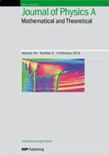
Journal of Physics A-Mathematical and Theoretical
Charting New Territories in Physics and AstronomyThe Journal of Physics A-Mathematical and Theoretical, published by IOP Publishing Ltd, is a premier peer-reviewed journal dedicated to advancing the understanding of mathematical physics, modeling, and simulation methods within the dynamic field of physics and astronomy. Established in the United Kingdom, this journal has made significant contributions over the years, maintaining a strong reputation as a Q1 and Q2 ranked journal across various categories, reflecting its influence in the scientific community. With a focus on innovative and theoretical approaches, it provides a platform for researchers, professionals, and students to disseminate their findings and engage with groundbreaking methodologies. Despite its lack of open access options, the journal's high impact factor and Scopus rankings, which place it in the top percentiles across multiple disciplines, underscore its critical role in fostering scholarly communication and collaboration in mathematical and theoretical physics. As we move through its converged years from 2007 to 2024, the Journal of Physics A continues to be a pivotal contributor to the landscape of contemporary physics, stimulating discussions and advancing knowledge in an ever-evolving realm.
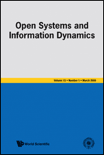
OPEN SYSTEMS & INFORMATION DYNAMICS
Unleashing Knowledge for Collaborative Scientific Discovery.OPEN SYSTEMS & INFORMATION DYNAMICS, published by World Scientific Publishing Co Pte Ltd, is a leading international journal dedicated to advancing research in the interdisciplinary areas of computational mechanics, information systems, and mathematical physics. With its ISSN 1230-1612 and E-ISSN 1793-7191, the journal has established itself as an influential platform for disseminating original research findings, reviews, and methodologies that address complex systems and dynamics. Its current impact factor reflects a solid reputation within the academic community, particularly amongst researchers in the fields of physics, statistics, and computational sciences. The journal's scope encompasses a diverse array of subjects, earning a Q2 classification in Computational Mechanics and Q3 in multiple other categories, including Fluid Flow and Transfer Processes and Information Systems. By providing open access to a wealth of knowledge, OPEN SYSTEMS & INFORMATION DYNAMICS is committed to fostering collaboration and innovation for students, researchers, and industry professionals alike, positioning itself as a cornerstone of scientific exploration and discovery in Singapore and beyond.

Physical Review Research
Showcasing the best in rigorous physics research.Physical Review Research, published by the American Physical Society, is a premier open access journal dedicated to the dissemination of high-quality research across all areas of physics and astronomy. Since its inception in 2019, this journal has quickly established itself as a vital platform for researchers, achieving a prestigious Q1 ranking in the dynamics of Physics and Astronomy (miscellaneous) and holding a commendable position in the Scopus Rankings with a rank of #29 out of 243, placing it in the 88th percentile. With the commitment to fostering scientific collaboration and transparency, Physical Review Research offers unrestricted access to valuable findings, enabling researchers, professionals, and students alike to engage with cutting-edge contributions in general physics and astronomy. As it converges into its forthcoming years of publication, the journal remains dedicated to showcasing rigorous research and innovative ideas that drive the field forward.
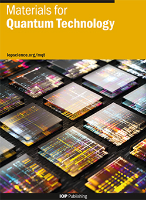
Materials for Quantum Technology
Catalyzing Collaboration in Quantum ResearchMaterials for Quantum Technology is a pioneering open-access journal published by IOP Publishing Ltd, dedicated to advancing the understanding and application of quantum materials and their technologies. Since its inception in 2021, this journal has become a significant platform for researchers, professionals, and students in the fields of condensed matter physics and materials science. With an impressive impact ranking, including a rank of #156 in Condensed Matter Physics and #86 in Atomic and Molecular Physics within Scopus, it offers an interdisciplinary view that facilitates the exchange of innovative ideas and research findings. The journal's open-access model ensures that groundbreaking research is accessible to a global audience, fostering collaboration in the rapidly evolving field of quantum technology. Materials for Quantum Technology continues to support the growing community of quantum researchers, playing a crucial role in the development of new materials and technologies that will shape the future of computation, communication, and sensing.

ACM Transactions on Quantum Computing
Leading the Charge in Quantum Computing ResearchACM Transactions on Quantum Computing (ISSN: 2643-6809, E-ISSN: 2643-6817), published by the Association for Computing Machinery, is a leading journal dedicated to advancing the field of quantum computing. With a focus on innovative research and applications, this journal serves as a prime venue for disseminating significant findings in quantum algorithms, quantum information theory, and quantum hardware. As a reflection of its quality and impact, the journal is highly ranked in several categories, including #8 in Physics and Astronomy and #18 in Computer Science according to Scopus metrics. The journal's scope encompasses groundbreaking research from 2020 to 2024, making it an essential resource for researchers, professionals, and students aiming to stay at the forefront of quantum computing advancements. Although it follows a traditional publishing model without an Open Access option, contributors can be assured of wide visibility and recognition in this rapidly evolving field. Explore cutting-edge topics and contribute to the ongoing discourse in quantum computing with ACM Transactions on Quantum Computing.
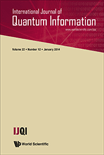
INTERNATIONAL JOURNAL OF QUANTUM INFORMATION
Unraveling the Mysteries of Quantum Computation and CryptographyINTERNATIONAL JOURNAL OF QUANTUM INFORMATION is a prominent academic journal published by World Scientific Publishing Co. Pte Ltd that serves as a critical platform for disseminating research in the rapidly evolving field of quantum information science. This journal, which has an ISSN of 0219-7499 and E-ISSN 1793-6918, covers significant advancements from 2005 to 2024, providing insights into quantum computation, quantum cryptography, and related topics that are essential for both theoretical and experimental physicists. The journal's influence is recognized in the academic community, as evidenced by its classification in the Q3 category within Physics and Astronomy (miscellaneous) as of 2023, where it ranks at #45 out of 81 with a percentile of 45. Although currently not available as an open access journal, it remains a pivotal resource for researchers and scholars aiming to stay at the forefront of quantum information research. As the field continues to grow in importance and application, the INTERNATIONAL JOURNAL OF QUANTUM INFORMATION plays a vital role in fostering innovative discoveries and promoting academic collaboration.

PHYSICAL REVIEW LETTERS
Advancing the Frontiers of Physics and AstronomyPhysical Review Letters, published by the American Physical Society, is a premier journal in the field of Physics and Astronomy renowned for its rapid dissemination of high-impact research findings. With a distinguished history dating back to 1958 and an impressive ranking of #13 out of 243 in the general physics category, it stands proudly within the Q1 quartile, placing it in the top 6% of journals in its field. The journal focuses on brief reports of significant fundamental research across all areas of physics, making it an essential resource for researchers, professionals, and students seeking to stay at the forefront of developments in their field. Although Physical Review Letters does not offer open access options, its rigorous peer-review process ensures a high standard of quality and relevance in its published articles. With an unwavering commitment to advancing the understanding of physical science, this journal is indispensable for those looking to make a genuine impact in their research endeavors.
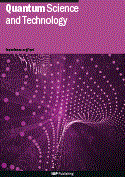
Quantum Science and Technology
Transforming Ideas into Quantum BreakthroughsQuantum Science and Technology is an esteemed academic journal published by IOP Publishing Ltd, specializing in the cutting-edge fields of quantum physics and technology. With a strong emphasis on innovation, the journal serves as a vital platform for researchers, professionals, and students engaged in Atomic and Molecular Physics, Electrical Engineering, and Materials Science. Since its inception in 2016, the journal has rapidly ascended to prominence, achieving Q1 rankings across multiple categories in 2023, reflecting its high impact and influence in the global scientific community. The journal is recognized for its rigorous peer-review process and commitment to disseminating groundbreaking research that pushes the frontiers of quantum science. Although it is currently not open access, the journal remains a pivotal resource for those seeking to stay at the forefront of developments in quantum technology and its applications. As part of its objectives, Quantum Science and Technology aims to connect diverse scholarly perspectives, fostering collaboration and knowledge exchange that can drive forward the quantum field.

npj Quantum Information
Connecting minds to revolutionize quantum applications.npj Quantum Information is a premier open-access journal published by NATURE PORTFOLIO, focusing on advancing the interdisciplinary field of quantum information science. First launched in 2015, the journal has rapidly established itself as a leading platform for innovative research, reflected in its impressive Q1 category rankings across multiple fields, including Computational Theory and Mathematics, Computer Networks and Communications, and Statistical and Nonlinear Physics. With an emphasis on publishing high-quality research, npj Quantum Information aims to disseminate pivotal findings that shape the future of quantum technologies and their applications. Its open-access model further enhances the accessibility of cutting-edge scholarly work, fostering collaboration and knowledge sharing among researchers, professionals, and students worldwide. With its commitment to excellence, the journal plays a crucial role in the intellectual landscape of quantum science, inviting contributions that push the boundaries of understanding and innovation.

QUANTUM INFORMATION & COMPUTATION
Transforming Ideas into Quantum RealitiesQUANTUM INFORMATION & COMPUTATION is a leading academic journal dedicated to the rapidly evolving fields of quantum information theory and quantum computing. Published by RINTON PRESS, INC, this journal serves as a pivotal platform for disseminating groundbreaking research, advancements, and theoretical insights in various domains including computational theory, mathematical physics, and high-energy physics. With its ISSN 1533-7146, the journal has established a solid reputation since its inception in 2001 and continues to engage researchers up to 2024. Despite its current standing in Q4 and Q3 quartiles across various categories, QUANTUM INFORMATION & COMPUTATION provides valuable contributions by fostering discussions on interdisciplinary applications and theories that challenge conventional paradigms. While the journal does not offer open access, it still supports a wide range of research topics, providing a vital resource for academics, professionals, and students keen on exploring the complex interplay between quantum mechanics and computation. By focusing on innovative techniques and theoretical developments, this journal is essential for anyone aiming to be at the forefront of the quantum revolution.